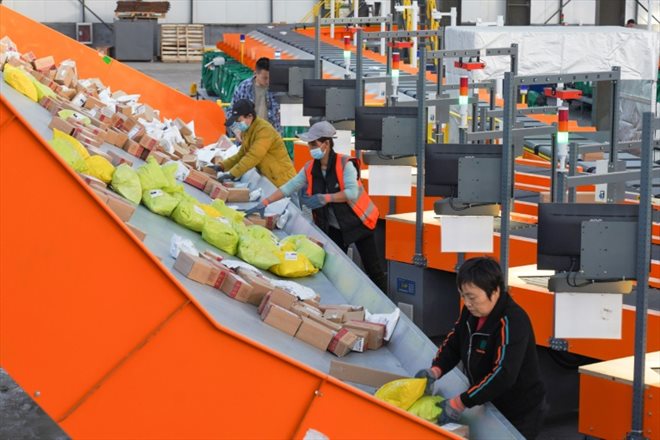“I
Two residents of Beijing on November 11, 2023 in front of a poster promoting “Singles’ Day”, a major sales operation in China which ends this year in a context of sluggish consumption. (AFP/WANG Zhao)
didn’t buy anything”: the “Singles’ Day”, a huge sales operation in China, ends at midnight on Saturday evening, but many are hardly planning to spend, against a backdrop of new consumption habits and economic difficulties.
Led by the Chinese online commerce giant Alibaba, this campaign, in which other competing platforms also participate, is a major event in the Asian country which extends over nearly three weeks.
Thanks to the widespread use of electronic payment and highly developed logistics, it is extremely easy in China to order or return products. This has often allowed “Singles’ Day” sales to break records.
Total sales during last year’s edition reached 1.1 trillion yuan (141 billion euros), according to a recent report from the American strategy and management consulting firm Bain.
But 77% of consumers surveyed by Bain said they don’t plan to spend more this year than normal.
“People at the moment are consuming less. They no longer really want to buy lots of things,” Zhang Chuwen, a 23-year-old graduate, told AFP.
She explains that she and her friends mainly take advantage of the opportunity to buy everyday products – also on sale.
Others also say that “Singles’ Day” promotions are no longer as interesting as in previous years.

Workers prepare packages for “Singles’ Day”, a huge sales operation in China, on November 10, 2023 in a warehouse in Nanjing (AFP/STR)
“The prices are not that different from usual. So I didn’t buy anything,” Guan Yonghao, a 21-year-old Chinese man, told AFP.
“We are going to save a little, because we earn less,” he emphasizes, against a backdrop of rising unemployment, particularly among young people.
– “More educated” –
For the second consecutive year, however, sales should exceed 1,000 billion yuan, anticipates Vincent Marion, based in Shanghai and co-founder of the consulting company VO2 Asia Pacific, specializing in new technologies.
“But sales are stagnating due to the change in consumption habits of the Chinese, who now favor savings. Consumers have become more educated, demanding and oriented towards more thoughtful spending,” he underlines.
The turnover from sales made since October 24, the start of the operation, has fallen by 7.5% compared to last year, according to VO2 Asia Pacific.
An example of this greater rationality of purchases, “42% of buyers during the current edition ordered everyday consumer goods” and there “are fewer luxury purchases,” notes Mr. Marion.
Singles’ Day sales have “lost their luster” due to several factors, adds Jacob Cooke, co-founder of e-commerce consultancy WPIC Marketing + Technologies, based in Beijing.

Employees at a logistics center sort packages for “Singles’ Day”, a huge sales operation in China, on November 10 in Zouping, in the province of Shandong (east) (AFP/STR)
“The strong development of live video broadcasting” via smartphone, which allows the Chinese to buy directly from influencers or producers “and the fact that there are other sales periods” during the year make that the relative appeal of Singles’ Day is “weaker”, he says.
– Deflation –
But even these animators-influencers are seeing a slowdown.
“Singles’ Day online sales are not as good as last year or two years ago,” said Liu Kai, who does live video streaming to sell products.
November 11 (11/11) is called “Singles’ Day” or “double eleven” in China because of the succession of “1”s in the date — all symbols of celibacy.
For the first time last year, neither Alibaba nor its main Chinese rival JD.com published their full sales figures for the 2022 edition, limiting themselves to indicating that they had remained stable.
In this context of sluggish consumption, China announced this week that it had fallen back into deflation in October, with prices down 0.2% year-on-year.
China has worked in recent months to revive its economy, unveiling a series of measures, particularly for the struggling real estate sector, as well as announcing a vast infrastructure spending plan.
© 2023 AFP
Did you like this article ? Share it with your friends using the buttons below.




